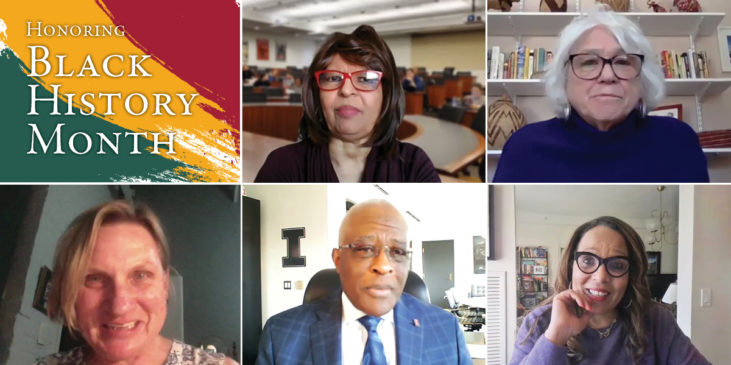For the month of February, we honor Black History Month, building on the foundation of equity and inclusion that supports our education both inside and outside of the classroom. As part of the month-long celebration, members of our community gathered for a panel discussion about the impact of the late Archbishop Emeritus Desmond Tutu, both in his home country of South Africa and around the globe.
Professor Penelope Andrews, Director of the NYLS Racial Justice Project, co-moderated with author Stephanie Urdang a wide-ranging and deeply compelling discussion featuring panelists with personal and professional relationships to the late Archbishop Tutu. Joining in the conversation were Pippa Green, Managing Editor, Econ 3X3 and former Press Ombudsman, South Africa; Dr. Robert Jones, Chancellor, University of Illinois, Urbana-Champaign; and Charlotte McClain-Nhlapo, Global Disability Advisor, The World Bank.
Dean and President Anthony W. Crowell welcomed the attendees to the virtual panel, noting that Black History Month highlights a heritage and history that is foundational to our country: “Black history is American history,” he said.
Archbishop Tutu’s work is especially meaningful to the NYLS community, Crowell explained, as so many NYLS professors, students, and alumni are working tirelessly to advance issues of restorative justice—a practice Archbishop Tutu championed in South Africa. Professor Andrews also highlighted the Archbishop’s championing of the principle of ubuntu, which translates to “I am because we are.” Both of these facets of his legacy, Professor Andrews said, made Archbishop Tutu the obvious choice for a conversation in our divided times.
Together, Professor Andrews and Urdang asked panelists questions about their experiences with Archbishop Tutu and his legacy. Panelists answered questions about lessons they’d learned from Archbishop Tutu (“Always say thank you,” Green quipped, or the importance of “finding joy and laughter as an important part of healing,” McClain-Nhlapo said), their personal relationships to him (“He was the only person allowed to call me Bob!” Jones laughed), ways in which we can incorporate the concept of ubuntu into increasingly divided American institutions, and the ways in which the Archbishop’s legacy—like the legacy of Dr. Martin Luther King Jr.—has been largely sanitized or “whitewashed.” Panelists also answered questions from an engaged audience, and the conversation was marked by dynamic energy. Conversations like these are crucial ways in which NYLS grapples with difficult histories and works to advance justice in New York City and beyond. They are acts of community care: collectively unpacking both inspirational and painful histories is a way in which we continue the critical work of advancing justice—and bring the spirit of ubuntu to NYLS.

